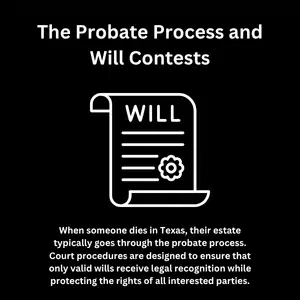Many families are shocked to learn how often a loved one’s will can be challenged, even when it appears to meet all legal requirements. In Texas probate court, a valid will can face will contests due to undue influence, lack of testamentary capacity, or improper execution.
These probate litigation cases are emotionally draining and financially costly. Understanding texas probate law and acting quickly with an experienced attorney can help you protect your rights and navigate the complex process with confidence.
A will contest is a formal challenge in probate court that questions a deceased person’s last will. Under Texas probate law and the Texas Estates Code, an interested party must show legal grounds, like undue influence, lack of testamentary capacity, or improper execution, to dispute the will’s validity. Probate litigation begins once someone files written opposition to the probate admission.
The person admitting the will must first prove it’s a valid will. Then, the burden shifts to the person contesting to provide substantial evidence, such as records or credible witnesses. Texas law sets strict deadlines. How long do you have to contest a will in Texas? Generally, two years after it’s admitted to probate. Acting quickly ensures relevant documents are preserved, and the probate process remains fair.

Not everyone has legal standing to contest a will in Texas court. Only an “interested party” or “person interested” in the estate can initiate these legal proceedings. This designation includes current beneficiaries named in the contested will, as well as individuals who would benefit from a previous will or those who would inherit under Texas intestacy laws if no will existed.
Family members often assume they automatically have the right to challenge a will, but courts apply their own rules when determining legal standing. Creditors with valid claims against the estate may also qualify as interested persons under certain circumstances. Sometimes friends, charitable organizations, or other parties named in earlier estate planning documents can successfully contest a will if they can demonstrate a direct financial interest.
The key factor is whether the person challenging the will would gain or lose something based on the outcome. Those who stand to inherit more under a previous will or through intestate succession typically have the strongest legal standing. Our Central Texas firm has helped many families right here in Woodway and across McLennan County navigate these complex standing requirements.
Texas law recognizes several valid grounds for contesting wills, each requiring different types of evidence and legal strategies. Improper execution represents one of the most common grounds, occurring when the testator failed to follow Texas’s legal requirements for creating a will. This might involve insufficient witnesses, improper notarization, or failure to sign the document in the testator’s presence as required by law.
Mental incapacity challenges focus on whether the deceased possessed testamentary capacity when they created or modified their will. The testator must have understood the nature of their property, recognized their family members and natural heirs, and comprehended the consequences of their decisions. Medical records often play a crucial role in proving lack of testamentary capacity, especially when the decedent suffered from dementia, Alzheimer’s disease, or other conditions affecting mental clarity.
Undue influence occurs when someone in a position of trust or authority manipulates the testator into changing their estate plans against their free will. Proving undue influence requires showing that the influencer had the opportunity and motive to coerce the deceased , and that the resulting will reflects the influencer’s desires rather than the testator’s true wishes. This complex process often involves gathering evidence about the relationship dynamics and the circumstances surrounding the will’s creation.
Fraud and duress represent serious allegations that the testator was deceived or threatened into signing the legal document. These cases require evidence demonstrating that the deceased acted under false pretenses or fear. Insane delusion involves proving that the testator held irrational beliefs that directly influenced their asset distribution decisions, even when they otherwise possessed sound mind and testamentary capacity.

An experienced attorney plays a vital role in will contests, beginning with the initial consultation where they evaluate the strength of your case and potential outcomes. Estate planning lawyers understand the intricate requirements of Texas law, including the specific conditions that make a holographic will valid, and can quickly identify whether you have valid legal grounds for challenging a will. They also help gather evidence systematically, ensuring that crucial documents and witness testimony are preserved before the discovery phase begins.
The legal journey of contesting wills involves multiple stages, from filing the initial challenge to potentially presenting your case before a jury trial. A skilled probate lawyer guides you through each step, developing compelling legal arguments based on the specific facts of your situation. They understand how to work with medical experts, handwriting analysts, and other professionals who can provide credible witnesses to support your claims.
Probate litigation requires thorough preparation and strategic thinking, especially when dealing with no contest clauses or complex family dynamics. An experienced probate attorney can evaluate whether the potential benefits outweigh the risks of challenging the will. We’ve helped families throughout McLennan County understand their options and make informed decisions about whether to proceed with a will contest.
The discovery phase allows both sides to examine relevant documents, take depositions, and build their cases. Your attorney will work to uncover evidence of improper execution, incapacity, undue influence, or other grounds for contesting the will. This comprehensive approach often reveals information that wasn’t apparent when the deceased person first created their estate planning documents.
Many wills include what’s known as a no contest clause or “in terrorem” provision, designed to discourage beneficiaries from challenging the will’s validity. These clauses typically state that anyone who contests the will and loses will forfeit their inheritance entirely. However, these clauses don’t make will contests impossible, and courts recognize several exceptions where challengers can proceed without risking their inheritance.
The effectiveness of these clauses depends on various factors, including the specific language used and the grounds for the contest. If you have evidence of fraud, forgery, or other serious misconduct, you may be able to challenge the will despite the presence of a no contest. Courts generally won’t enforce these provisions when the challenge is made in good faith with probable cause.
Before proceeding with a will contest involving a no contest clause, it’s crucial to work with an experienced attorney who can assess the risks and benefits. The legal strategy must be carefully crafted to maximize your chances of success while minimizing potential losses. Our firm regularly advises clients about the implications of these clauses and helps them make informed decisions about their legal options.

When someone dies in Texas, their estate typically goes through the probate process, during which the probate court determines the validity of the deceased’s last will. If no one contests the will, it’s usually admitted to probate relatively quickly, and the estate administration proceeds smoothly. However, when interested parties raise objections, the probate process becomes more complex and time-consuming due to inheritance disputes and other legal challenges.
The probate admission process requires the person seeking to prove the will (usually the named executor) to present evidence that the document is valid and properly executed. This typically involves testimony from witnesses who observed the will’s signing and evidence that the testator possessed the necessary mental capacity, often referred to as being of sound mind. Under state laws, the court may also consider the validity of a holographic will if one is presented following the decedent’s death.
If someone files a formal contest, the court must resolve these disputed issues before the estate can move forward. Navigating these matters often requires the guidance of a skilled probate attorney or probate lawyer, particularly when dealing with complex estate matters and conflicts among heirs.
Court procedures are designed to ensure that only valid wills receive legal recognition while protecting the rights of all interested parties. The court decides these matters based on the evidence presented, and both sides have the opportunity to present their case fully. Understanding these state laws and procedures is essential for anyone considering a will contest or defending against one.
A successful challenge to a will requires substantial evidence supporting your legal claims. Evidence gathering is a methodical process that often involves reviewing records, financial documents, and communications between the deceased and potential influencers. The strength of your evidence directly impacts your chances of achieving success in court.
Medical records can be particularly important in cases involving questions about testamentary capacity. These documents may reveal information about the decedent’s mental state, medication effects, or cognitive decline that occurred around the time the will was created. Expert medical testimony can help interpret these records and explain their significance to the court.
Witness testimony from people who observed the deceased’s behavior, mental state, or interactions with others can provide crucial support for your case. Witnesses who can speak to the testator’s capacity, the presence of undue influence, or improper execution procedures can make or break a will contest. Documenting these relationships and preserving testimony early in the process is essential.

Texas courts have extensive experience handling probate litigation and will contests, but each case presents unique challenges and circumstances. Understanding how these courts operate and what they expect from litigants can significantly impact the outcome of your case. Judges in probate courts are familiar with the common grounds for contesting wills and the types of evidence needed to support various claims.
The proceedings in a will contest can be lengthy and complex, involving multiple hearings, discovery disputes, and potentially a jury trial. Courts expect parties to follow proper procedures and present their evidence in a clear, organized manner. Having legal guidance throughout this process helps ensure that deadlines are met and procedural requirements are satisfied.
At our Woodway-based firm, we’re familiar with the local probate judges, court procedures, and estate planning concerns unique to this area. This local knowledge can be invaluable when navigating the complexities of a will contest in courts.
If you believe a loved one’s will should be contested, time is of the essence. The complex process of challenging a will requires immediate action to preserve evidence, identify witnesses, and meet legal deadlines. Waiting too long can result in lost opportunities and weakened legal arguments that could have made the difference in your case.
The track record of success in will contests often depends on early preparation and thorough investigation of the circumstances surrounding the will’s creation. An initial consultation with an experienced estate planning lawyer can help you understand your options and the strength of your potential case. This evaluation considers the specific facts of your situation, the available evidence, and the likelihood of achieving your desired outcome.
Whether you’re concerned about undue influence, improper execution, lack of mental capacity, or other issues affecting a will’s validity, professional legal guidance can help you make informed decisions about how to proceed. The deceased’s wishes deserve to be honored, but only when they’re expressed through a valid will created under proper circumstances.
Contact our firm today for a confidential review of your situation. We understand the sensitive nature of these family matters and provide compassionate, professional representation for clients throughout Central Texas. Don’t let important deadlines pass while you’re dealing with grief and family dynamics – let us help you protect your rights and interests during this difficult time.